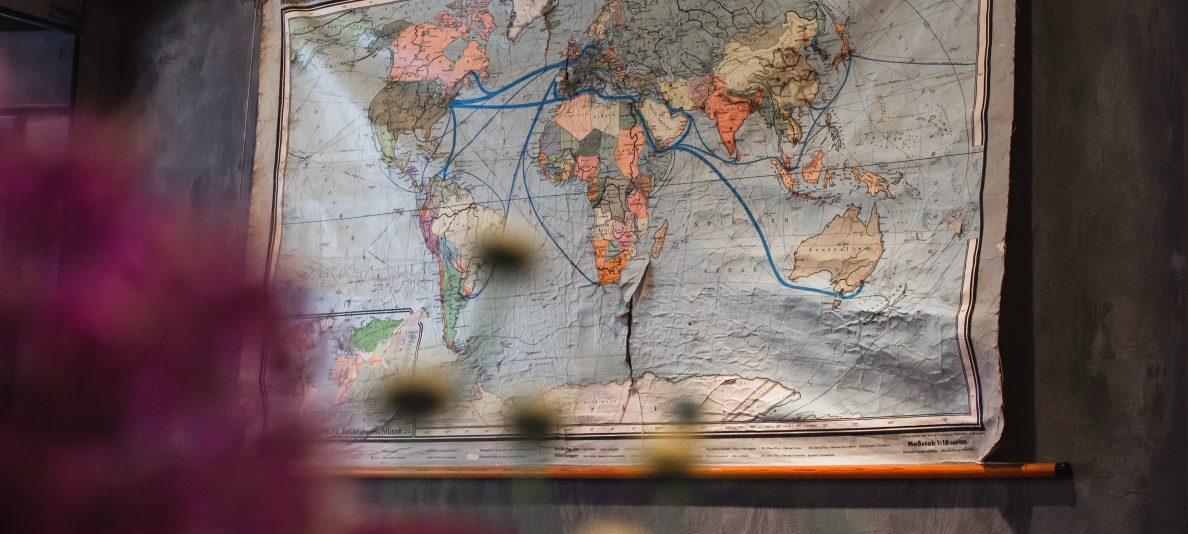
Ask a Third Culture Kid, “Where are you from?” and in response you might get a deep sigh or a quizzical look . . . or a quick, simple answer that staves off more questions. There are other ways to ask for the same information. There’s “Where’s home?” A better question might be “Where have you lived?” Or if you’re a fan of quizzical looks, you could ask, “Where do you hail from?” Hmmmmm. What does that even mean?
Ask no more. (I’m referring to the question, “What does that even mean?” not “Where are you from?”)
According to Douglas Harper of the Online Etymology Dictionary, hail is a
salutation in greeting, c. 1200, from Old Norse heill “health, prosperity, good luck,” or a similar Scandinavian source, and in part from Old English shortening of wæs hæil “be healthy.”
The dictionary goes on to say that around the same time the verb heilen appeared, meaning “to call from a distance.” Then it tackles to hail from, referencing The Dictionary of Americanisms, which, in 1848, called it “a phrase probably originating with seamen or boatmen . . . meaning to come from, to belong to.”
The same entry gives the date of origin for to hail from as 1841. But I did some searching of my own, using Google Books, and found an occurrence (same wording, same meaning) from March 27, 1832. It was spoken by US representative Franklin E. Plummer of Mississippi, during a House debate on a bill concerning the sale of public lands:
Who are the citizens of the old States, that they should be envious of the growing prosperity of their younger sister States? Are we not from the same common stock and origin; and ought not our interests and feelings to be the same? We participated equally with the present population of the old States in the battles of the revolution. It is not the gentleman from New York, nor his constituents, to whom we are indebted for the achievement of those glorious victories of which he so loudly boasts, and of which we all have reason to be proud. It was not the gentleman on my right, [Mr. Briggs,] who hails from the ancient commonwealth, and represents my native district, that fought those battles which secured to us that independence and that liberty which we all in common enjoy; but it was his grandsire and mine, who fought, side by side, at the memorable battles of Lexington and Bunker’s Hill.
The 1841 date comes from the Oxford English Dictionary, which is one of Harper’s sources. Does that mean I’ve scooped the OED? Is a Netflix movie with the title The Publisher and the Blog Guy in my future?
I doubt you’ll get the reference, so let me explain. I’m thinking about the 2019 film The Professor and the Madman, starring Mel Gibson and Sean Penn. The story, based on true events, goes like this: In the late 1800s, James Murray (the “professor”) became the editor of a work that would in time grow into the OED. In order to tackle the massive project, he enlisted volunteers to scour English literature to find the oldest usages of words. One of those volunteers was an American, William Chester Minor (the “madman”). Minor had been a surgeon in the Union army during the Civil war, moved to England, and, suffering from mental illness, shot and killed a man. He was deemed insane and placed in an asylum, and it was there, surrounded by his collection of books, that he became one of the OED‘s major contributors. He was befriended by Murray, and their story became the subject of Simon Winchester’s 1998 novel The Surgeon of Crowthorne: A Tale of Murder, Madness, and the Love of Words, later published as The Professor and the Madman.
I’m thinking that Steven Spielberg could direct my biopic, highlighting my new efforts in updating the OED. And Tom Hanks would probably do a decent job portraying me. My story wouldn’t be as dramatic as Minor’s, but who knows what Spielberg and Hanks could do with some poetic license. Yes, I can almost smell the popcorn. . . .
Well, maybe not. It’s awfully hard to imagine floating among the cinematic stars when others keep pulling you down to earth. There’s Douglas Harper, for one. I found an interview he did with the Institute for Multi-Sensory Education, in which he says “I can go trace modern words and usages (post-1700) using digital archives.” Hey, that’s what I did! And then he puts me in my place with “I can back-date the OED 5 times in 10 minutes.”
OK, OK, he’s got me beat . . . by a long shot. I guess I’ll humbly step aside and let Harper be the subject of the next blockbuster movie on word etymologies. But I still went ahead and sent in my finding to the OED, using their online submission form. And for that I received the following message:
Thank you for submitting your word or evidence!
Yes, it was in red. And, yes, it ended with an exclamation mark.
If that isn’t encouraging, then I don’t know what is. I’m not giving up yet. I hail from a long line of dreamers, after all.
Douglas Harper, “hail,” Online Etymology Dictionary; John Bartlett, The Dictionary of Americanisms: A Glossary of Words and Phrases, Usually Regarded as Peculiar to the United States, Bartlett and Welford, 1848; Register of Debates in Congress, vol. 8, part 2, Gales and Seaton, 1833; “Q&A With Douglas Harper: Creator of the Online Etymology Dictionary,” IMSE Journal, June 18, 2015)
[photo: “Land Ho!” by anoldent, used under a Creative Commons license]




 professionally and in community theatre since before I was born, so the smell of theatres and the excitement of the creative process were a “home” to me from a young age. I started acting at school and in community theatre as a kid in Panama, and my love for it only grew as I grew up.
professionally and in community theatre since before I was born, so the smell of theatres and the excitement of the creative process were a “home” to me from a young age. I started acting at school and in community theatre as a kid in Panama, and my love for it only grew as I grew up.


